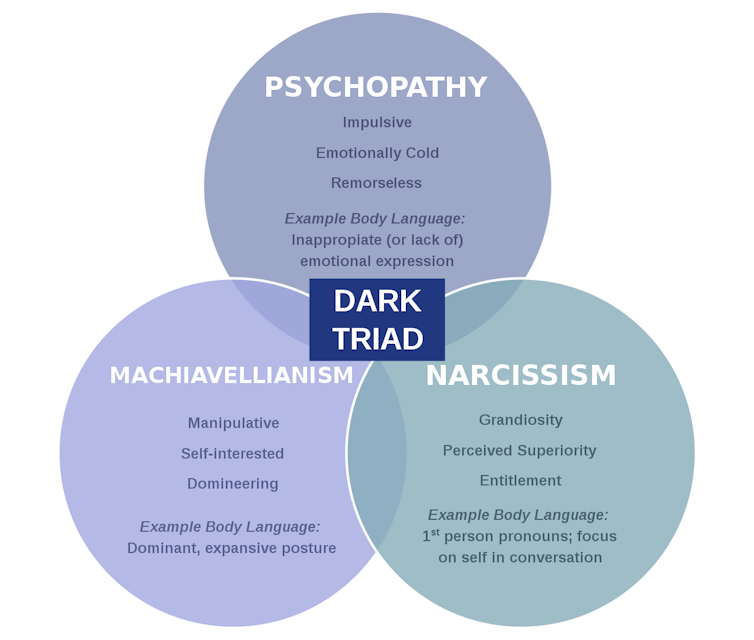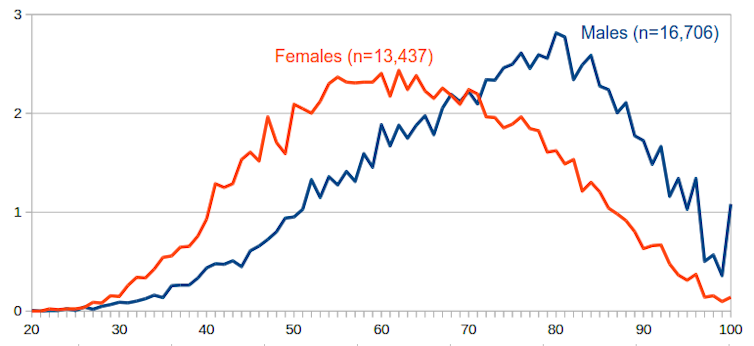Source: The Conversation (Au and NZ) – By Nelly Liyanagamage, Lecturer, University of Notre Dame Australia

Shutterstock
You’ve been pressured to work overtime to finish a project. You won’t get paid for the extra hours but you’ve been assured there will be kudos from senior management. There is – but only for your boss, who takes the credit.
You’re a hard, efficient worker, but your manager closely monitors you, demanding you constantly account for your time and questioning your actions, as if you can’t be trusted.
You find out your boss is overclaiming on expenses. When you bring this to their attention, they ask you not tell anyone until they work it out. They then mention they’re considering recommending you for a promotion.
These are signs of Machiavellianism, the dark personality trait named after the 16th century Italian political theorist who wrote the first “how to” guide for rulers.
A Machiavellian personality is self-serving, opportunistic and ambitious – traits that can help them attain positions of power and status.
Estimates of the prevalence of Machiavellianism are imprecise, but experts have good reason to believe it is at least as common in the workplace as psychopathy, which affects about 1% of the population but an estimated 3.5% of executives.
For example, US business author Lewis Schiff says 90% of the millionaires he surveyed for his book Business Brilliant: Surprising Lessons from the Greatest Self-Made Business Icons agreed with the statement “it’s important in negotiations to exploit the weaknesses in others”, compared with just 24% of those with “middle-class” incomes.
Working for a Machiavellian boss is likely to be infuriating, stressful and bad for your mental health. By understanding what drives this personality, and how it differs from the other “dark personality traits”, you can limit the fallout.
Origins of Machiavellianism
Niccolo Machiavelli (1469–1527) was a diplomat in Florence during a period of power struggle involving the powerful Medici family. When the Medicis returned to rule the city in 1512 after almost two decades in exile, he was briefly imprisoned and then banished. He then wrote Il Principe (The Prince) as a sort of job application.

Shutterstock, CC BY
The book (not formally published till 1532, though copies circulated in the two decades before) is regarded as the first work of modern political philosophy. It advises rulers to be pragmatic, cunning and strategic. “The lion cannot protect himself from traps,” it says, “and the fox cannot defend himself from wolves. One must therefore be a fox to recognise traps and a lion to frighten wolves.”
In 1970 two US psychologists, Richard Christie and Florence Geis, published Studies in Machaivellianism, using the term for a personality trait characterised by self-interest, manipulativeness, opportunism and deceitfulness.
Read more:
These are the characteristics of people most likely to cut corners at work
Joining the ‘Dark Triad’
Machiavellianism is now accepted as one of three antisocial personality types that comprise the “Dark Triad” – the other two being narcissism and psychopathy. However, while the three traits are lumped together due to their antisocial qualities, there are important differences.

Wikimedia Commons, CC BY
Narcissism is a set of traits as well as a personality disorder, characterised by egoism, self-absorption and the need to feel superior to others. Psychopathy is also a diagnosable personality disorder, defined by lack of empathy or conscience. Machiavellianism is not classified as a formal personality disorder.
A Machiavellian personality can be charismatic, like a narcissist, but is driven by self-interest rather than self-aggrandisement. They tend to be calculating rather than impulsive like a psychopath.
Christie and Geis came up with a 20-question checklist, based on statements from Machiavelli’s writings, to gauge Machiavellian traits. This test, known as the MACH-IV, is still being used.
Data collected on those taking the test shows, on average, that men score higher than women, and are more likely to get the highest possible result (~1% compared with ~0.2%).

Open Source Psychometrics Project, CC BY
A score of 60 or more out of 100 on the test is deemed “high Machiavellianism”, and less than 60 as “low Machiavellianism”.
A “high Mach” will likely be highly manipulative, in ways you won’t even necessarily identify as manipulation at the the time. A “low Mach” will tend be more empathetic and more reluctant to exploit others.
But knowing which is which in real life isn’t so straightforward. “Everyone sees what you appear to be, few experience what you really are,” as Machiavelli writes in The Prince. It is important to remember this even when approaching “low Mach” individuals. The boss who assures you they have your best interests at heart might just be telling you what you want to believe.
How to deal with a Machiavellian boss
A Machiavellian boss may seek to manipulate
with flattery or bullying, promising reward or threatening punishment.
They are less likely to trust you, causing them to micromanage and criticise. Your feelings are of little concern. This experience can leave you angry, emotionally exhausted and cynical.
So how to deal with a Machiavellian boss?
The first lesson is to be clear about what drives a Machiavellian personality. Fundamentally that is self-interest. You can’t judge motivations according to superficial charm or niceness. They may seem kind, caring and helpful most of the time – because that works for them. But be warned: if you’ve been on the receiving end of their “dark” traits before, you should expect it to happen again, sooner or later, when circumstances suit.
The second lesson is harder. You can’t trust a Machiavellian, and need to deal with them cautiously. But distrusting your boss and operating with a “strike before the other does” mindset will, if you’re a relatively normal person, be emotionally draining. You may find yourself becoming more cynical and distrustful generally.
Machiavelli endorsed the strategy of “divide and conquer” in another of his books (The Art of War, published in 1521). Take the opposite tack. This is a time for solidarity. Having a support network and knowing that you are not alone, can serve as an emotional pillar.
Read more:
Here’s what to do when you encounter people with ‘dark personality traits’ at work
There are no laws against being a manipulative, scheming and self-interested boss. But if these traits manifest as bullying, abuse or victimisation, there is action you may be able to take. For advice contact your union or workplace regulator, such as Australia’s Fair Work Ombudsman, Britain’s Advisory, Conciliation and Arbitration Service, or Employment New Zealand.
Manipulation, deceit and bullying should never be considered acceptable or necessary. Your psychological and physical wellbeing matters.
![]()
The authors do not work for, consult, own shares in or receive funding from any company or organisation that would benefit from this article, and have disclosed no relevant affiliations beyond their academic appointment.
– ref. Manipulative, distrustful, self-serving: how to deal with a Machiavellian boss – https://theconversation.com/manipulative-distrustful-self-serving-how-to-deal-with-a-machiavellian-boss-209210




